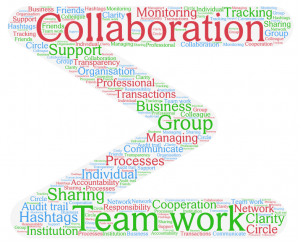All businesses collaborate in some form or the other. Whether they realise it or not is the issue. To make collaboration contribute towards long term growth, it must do the following:
– Solve real business problems.
– Must complement the working style & task flow intuitively.
– Be in sync with the working culture.
Let us look the challenges that most SMEs solve, with the help of collaboration tools these days:
1. Communication:
With email being the standard norm of communication, the need for being in touch anytime anywhere is also emerging.
Ex – With sales staff out in the field, getting in touch with the operations team to respond to customers’ queries is essential. If it is a B2B service requirement, the service staff catering to the customers would find it really helpful to collaborate with operations/marketing to solve pain areas or cater to new customer needs.
Email does not suffice for this kind of communication. So SMEs use whatsapp groups to get someone to respond promptly. All this communication happens only to cater to the “in-the-moment” kind of situations.
2. Brainstorming:
Brainstorming about an idea, project or client’s proposal needs a platform to collect all the floating ideas. The tool which enables such collaboration is as important as the culture of the organisation.
Ex – Building a proposal for the client! If there are four teams working together on it, the proposal is split into four areas using a excel sheet and requirements are defined for each team. However, the excel sheet does not help the teams to fit all the inputs in a powerful synthesis and make a compelling proposal for the client.
Further, the communication around the various aspects of proposal is done using emails, messengers or ad-hoc meetings. This is a classic case of collaboration where the sheer amount of resource, time and cost involved is easily missable.
3. Tracking Leads:
Business development teams have already a lot on their plate and hence love to use tools that keep them on top of all the lead generation efforts.
Most teams that venture out on the ambitious journey of boosting sales instinctively use free collaboration tools like Google spreadsheet, Excel trackers, Whatsapp updates & Group SMSes.
Ex – The BD team decides to work on a lead generation campaign by calling. The calling list is uploaded on a common spreadsheet and tracked for daily performance. The access rights are carefully assigned to who can edit and who can view. The daily updation is done diligently. Inspite of all these efforts, the team leader has to still fight issues like duplication, manual entry, erroneous entries, task continuity and delegation.
Does this kind of collaboration help?
Yes. For now. Businesses do not live in the here and now. They live today to be able to grow tomorrow. Unless your collaboration tool is scalable and solves your business problems, it would hardly be anything more than a operation tool like the various gadgets used to accomplish tasks.
A team needs a laptop, mobile, tab, internet connection, a working environment, etc to start work. However, a team needs to build a scalable system of collaboration to grow.
Are you also trying to solve business challenges using such free tools? Talk to us in the comments section


